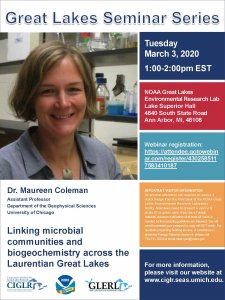Presented By: Cooperative Institute for Great Lakes Research (CIGLR)
Great Lakes Seminar Series
Dr. Maureen Coleman

Please join us for a Great Lakes Seminar Series presentation!
Date: Tuesday, March 3
Time: 1:00-2:00 pm EDT
Attend In-Person: NOAA Great Lakes Environmental Research Laboratory, Lake Superior Hall* (Directions)
Attend Remotely: https://attendee.gotowebinar.com/register/4302585117583410187
Presenter: Maureen Coleman, University of Chicago
Title: Linking microbial communities and biogeochemistry across the Laurentian Great Lakes
About the presentation: The Laurentian Great Lakes hold 20% of Earth’s surface freshwater and provide essential ecosystem services. Moreover, as an interconnected waterway that spans strong environmental gradients, the Great Lakes represent a unique natural laboratory for understanding how physical, chemical, and biological forces interact to shape microbial communities and biogeochemistry. Here we explore the drivers of microbial diversity and activity across the Great Lakes, using samples collected as part of an ongoing multi-year time series. First we characterized community composition across lakes, depths, seasons, and years. We found that depth and light are strong drivers of community structure in stratified water columns. Across surface waters, we found distinct microbial signatures in each of the Great Lakes, reflecting their biogeochemical variability. To explore metabolic functions, we reconstructed hundreds of microbial genomes and created a microbial tree of life for the Laurentian Great Lakes. We mapped ecological distribution patterns for these genomes and found distinct distributions for taxa and metabolisms across lakes and depths. We focus here on two important groups for ecology and biogeochemistry, the cyanobacteria and nitrifying Bacteria and Archaea. Our work represents the first picture of microbial diversity across the entire Laurentian Great Lakes and is an essential baseline from which to monitor future ecosystem change.
About the speaker: Dr. Coleman is an Assistant Professor in the Department of the Geophysical Sciences at the University of Chicago. She is a microbial ecologist who studies the causes and consequences of microbial diversity in aquatic systems. Currently her lab is busy characterizing microbial communities, genomic diversity, and biogeochemistry across the Laurentian Great Lakes. She is also cultivating new microbial lineages and developing genetic tools to study their biology. She holds an undergraduate degree in biology from Dartmouth College and a Ph.D. in Civil and Environmental Engineering from MIT. She was a postdoc at MIT & Caltech before joining the University of Chicago in 2012.
Registration is not required to attend in-person, however please note important visitor information below
Important Visitor Information
All in-person seminar attendees are required to receive a visitor badge from the front desk at the NOAA Great Lakes Environmental Research Laboratory facility. Seminar attendees need to present a valid U.S. photo ID or green card. If you are a Foreign National, advance notification of at least 48 hours is needed so that security guidelines are followed. You will need to present your passport (a copy will NOT work). For questions regarding building access, or assistance in obtaining Foreign National clearance, please call 734-741-2394. Email contact: Scott.Purdy@noaa.gov
_____________________________________________________
Questions? Contact Mary Ogdahl: ogdahlm@umich.edu
Visit ciglr.seas.umich.edu for more information.
Date: Tuesday, March 3
Time: 1:00-2:00 pm EDT
Attend In-Person: NOAA Great Lakes Environmental Research Laboratory, Lake Superior Hall* (Directions)
Attend Remotely: https://attendee.gotowebinar.com/register/4302585117583410187
Presenter: Maureen Coleman, University of Chicago
Title: Linking microbial communities and biogeochemistry across the Laurentian Great Lakes
About the presentation: The Laurentian Great Lakes hold 20% of Earth’s surface freshwater and provide essential ecosystem services. Moreover, as an interconnected waterway that spans strong environmental gradients, the Great Lakes represent a unique natural laboratory for understanding how physical, chemical, and biological forces interact to shape microbial communities and biogeochemistry. Here we explore the drivers of microbial diversity and activity across the Great Lakes, using samples collected as part of an ongoing multi-year time series. First we characterized community composition across lakes, depths, seasons, and years. We found that depth and light are strong drivers of community structure in stratified water columns. Across surface waters, we found distinct microbial signatures in each of the Great Lakes, reflecting their biogeochemical variability. To explore metabolic functions, we reconstructed hundreds of microbial genomes and created a microbial tree of life for the Laurentian Great Lakes. We mapped ecological distribution patterns for these genomes and found distinct distributions for taxa and metabolisms across lakes and depths. We focus here on two important groups for ecology and biogeochemistry, the cyanobacteria and nitrifying Bacteria and Archaea. Our work represents the first picture of microbial diversity across the entire Laurentian Great Lakes and is an essential baseline from which to monitor future ecosystem change.
About the speaker: Dr. Coleman is an Assistant Professor in the Department of the Geophysical Sciences at the University of Chicago. She is a microbial ecologist who studies the causes and consequences of microbial diversity in aquatic systems. Currently her lab is busy characterizing microbial communities, genomic diversity, and biogeochemistry across the Laurentian Great Lakes. She is also cultivating new microbial lineages and developing genetic tools to study their biology. She holds an undergraduate degree in biology from Dartmouth College and a Ph.D. in Civil and Environmental Engineering from MIT. She was a postdoc at MIT & Caltech before joining the University of Chicago in 2012.
Registration is not required to attend in-person, however please note important visitor information below
Important Visitor Information
All in-person seminar attendees are required to receive a visitor badge from the front desk at the NOAA Great Lakes Environmental Research Laboratory facility. Seminar attendees need to present a valid U.S. photo ID or green card. If you are a Foreign National, advance notification of at least 48 hours is needed so that security guidelines are followed. You will need to present your passport (a copy will NOT work). For questions regarding building access, or assistance in obtaining Foreign National clearance, please call 734-741-2394. Email contact: Scott.Purdy@noaa.gov
_____________________________________________________
Questions? Contact Mary Ogdahl: ogdahlm@umich.edu
Visit ciglr.seas.umich.edu for more information.